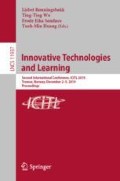Abstract
The aim of this study was to find ways to modernize Sámi language teaching and teaching in the Sámi language with digital technology. We realize the importance of digital technology in enhancing the sociocultural position of minority and Indigenous languages. However, the lack of teaching and learning material in the Sámi language is still challenging. Free digital teaching and learning tools could help produce and provide learners with multimodal learning material and new ways of learning. Moreover, competencies in the use of digital technology are an internationally accepted key element of teacher education. The Focus on the North–Digital Learning for Pre- and In-Service Teacher Education Project, funded by Norgesuniversitet in cooperation with the Sámi allaskuvla - Sámi University of Applied Sciences (SUAS) in Norway and the University of Lapland in Finland, aimed to address challenges affecting education in the Arctic educational context by creating a 15-credit (ECTS) course program with three courses on digital tools in education. SUAS practice schools are in Norway, Finland, and Sweden, so distance learning and teaching didactics were designed as the core of this project. Student teachers and in-service teachers at all education levels participated in the courses. The findings indicated that teachers’ and student teachers’ experiences of personalized collaborative learning in using digital teaching tools to support Sámi language teaching were remarkable in practice, as teachers gained access to tools for coping in a demanding educational context. Digitalization provides new ways to improve learning in a threatened language context.
Access this chapter
Tax calculation will be finalised at checkout
Purchases are for personal use only
References
Bielaczyg, K., Collins, A.: Learning communities in classrooms: a reconceptualization of educational practice. In: Reigeluth, C.M. (ed.) Instructional Design Theories and Models: A New Paradigm of Instructional Theory, vol. 2, pp. 269–292. Routledge, New York (2009)
Creswell, J.W., Poth, C.N.: Qualitative Inquiry and Research Design: Choosing Among Five Approaches. Sage, New York (2017)
Foldnes, N.: The flipped classroom and the cooperative learning: evidence from a randomized experiment. Active Learn. High. Educ. 17, 39–49 (2016)
Fyrenius, A., Bergdhal, B., Silén, C.: Lectures in problem-based learning - why, when, and how? An example of interactive lecturing that stimulates meaningful learning. Med. Teach. 27, 61–65 (2005). https://doi.org/10.1080/01421590400016365
Golonka, K., Mojsa-Kaja, J.: Emotional intelligence and team roles - analysis of interdependencies with regard to teamwork effectiveness. Int. J. Contemp. Manag. 12, 32–44 (2013)
Haines, R.: Group development in virtual teams: an experiential re-examination. Comput. Hum. Behav. 39, 213–222 (2014). https://doi.org/10.1016/j.chb.2014.07.019
Jackson, D., et al.: Small group learning: graduate health students’ views of challenges and benefits. Contemp. Nurse 48, 117–128 (2014)
Johnson, D.W., Johnson, R.T.: Cooperation and Competition: Theory and Research. Interaction Book, Edina (1989)
Johnson, D.W., Johnson, R.T.: An educational psychology success story: social interdependence theory and cooperative learning. Educ. Res. 38, 365–379 (2009)
Keskitalo, P., Frangou, S.-M.: Problemstillinger for refleksjonsnotat (Focus on the North) NUV-prosjekt. Sámi allaskuvla and University of Lapland, Guovdageaidnu and Rovaniemi (2019)
Löfström, E., Nevgi, A.: From strategic planning to meaningful learning: diverse perspectives on the development of web-based teaching and learning in higher education. Br. J. Educ. Technol. 38, 312–324 (2007)
Maruping, L.M., Magni, M.: Motivating employees to explore collaboration technology in team contexts. MIS Q. 39, 1–16 (2015). https://doi.org/10.25300/MISQ/2015/39.1.01
McCallum, S., Schultz, J., Sellke, K., Spartz, J.: An examination of the flipped classroom approach on college students’ academic involvement. Int. J. Teach. Learn. High. Educ. 27, 42–55 (2015)
Outakoski, H., Cocq, C., Steggo, P.: Strengthening Indigenous languages in the digital age: Social media–supported learning in Sápmi. Media Int. Aust. 169, 21–31 (2018)
Savage, E., Tapics, T., Evarts, J., Wilson, J., Tirone, S.: Experiential learning for sustainability leadership in higher education. Int. J. Sustain. High. Educ. 16, 692–705 (2015)
Slavin, R.E.: When and why cooperative learning increase achievement? Theoretical and empirical perspectives. In: Hertz-Lazarowitz, R., Miller, N. (eds.) Interaction in Cooperative Books: The Theoretical Anatomy of Group Learning, pp. 145–173. Cambridge University Press, New York (1992)
Sweet, M., Michaelsen, L.K.: How group dynamics research can inform the theory and practice of postsecondary small group learning. Educ. Psychol. Rev. 19, 31–47 (2007)
Toulouse, P.: What matters in indigenous education: implementing a vision committed to holism, diversity and engagement. In: Measuring What Matters, People for Education. Toronto (2016)
Vuopala, E., Hyvonen, P., Järvelä, S.: Interaction forms in successful collaborative learning in virtual learning environments. Active Learn. High. Educ. 17, 25–38 (2016)
Webb, M.: Changing models for researching pedagogy with information and communication technologies. J. Comput. Assist. Learn. 29, 53–67 (2013)
Wheelan, S.A., Davidson, B., Tilin, F.: Group development across time: reality or illusion? Small Group Res. 34, 223–245 (2003)
Author information
Authors and Affiliations
Corresponding author
Editor information
Editors and Affiliations
Rights and permissions
Copyright information
© 2019 Springer Nature Switzerland AG
About this paper
Cite this paper
Keskitalo, P., Frangou, SM., Chohan, I. (2019). Focus on Personalized Collaborative Learning: What Can We Learn from the Indigenous Sámi Teachers’ Supplementary Study Program on Digital Learning Tools?. In: Rønningsbakk, L., Wu, TT., Sandnes, F., Huang, YM. (eds) Innovative Technologies and Learning. ICITL 2019. Lecture Notes in Computer Science(), vol 11937. Springer, Cham. https://doi.org/10.1007/978-3-030-35343-8_71
Download citation
DOI: https://doi.org/10.1007/978-3-030-35343-8_71
Published:
Publisher Name: Springer, Cham
Print ISBN: 978-3-030-35342-1
Online ISBN: 978-3-030-35343-8
eBook Packages: Computer ScienceComputer Science (R0)

